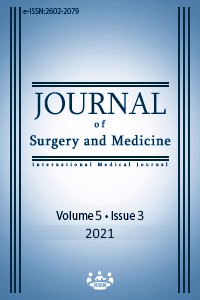Antimicrobial effect of local anesthetics on Helicobacter pylori
Keywords:
Helicobacter pylori, antimicrobial, lidocaine, adrenaline, bupivacaine, prilocaineAbstract
Background/Aim: Helicobacter pylori (HP) is a gram-negative bacillus, with a prevalence of 50% throughout the world. HP infection is considered the strongest etiological factor for gastric cancer (GC). Therefore, early diagnosis and treatment of HP can be considered as the primary prevention strategy for the development of GC. This study aimed to reveal the antimicrobial effect of commonly used local anesthetics (LAs) on HP. The literature review in English has revealed no study on this subject. Methods: This in vitro laboratory study was conducted in a University laboratory between 25 October 2019 and 1 November 2019. In the study, antimicrobial effect of 1 mL sterile saline, 20 mg/mL lidocaine, 1 mg/mL adrenaline, 10 mg/mL prilocaine, 50 mg/mL bupivacaine, and 20 mg+0.0125 mg/mL lidocaine plus adrenaline against H. pylori strain NCTC 11637 obtained from National Collection of Type Cultures (NCTC) were tested in vitro. The groups were designated as follows: Group C (Control), Group B (Bupivacaine), Group L (Lidocaine), Group A (Adrenaline), Group P (Prilocaine), and Group LA (Lidocaine plus adrenaline). HP strain NCTC 11637 was cultured in Mueller Hinton agar (Oxoid, UK) supplemented with 5% sheep blood plates at 37°C under microaerophilic conditions (5% oxygen, 10% carbon dioxide, and 85% nitrogen gas combination) for 72 hours. Results: Antimicrobial activity was observed in Group L and Group LA. No antimicrobial action against HP was observed in other groups. The comparison of groups in terms of inhibition zone diameters showed that there was a statistically significant inhibiting effect in Group L and Group LA compared to Group C (P=0.002 and P<0.001, respectively). Conclusion: Among the LAs used in the present study, lidocaine and lidocaine + adrenaline had antimicrobial action against HP whereas bupivacaine and prilocaine had no statistically significant effect. Therefore, we believe that lidocaine can be used in the eradication therapy of HP. If the findings obtained from the present study are supported by clinical trials, lidocaine can help break the increasing resistance mechanisms in the treatment of HP or can be used in its treatment, which may help to improve treatment success and reduce treatment costs.
Downloads
References
Manyi-Loh CE, Clarke AM, Green E, Ndip RN. Inhibitory and bactericidal activity of selected South African honeys and their solvent extracts against clinical isolates of Helicobacter pylori. Pak J Pharm Sci. 2013;26:897-906.
Malfertheiner P, Megraud F, O’Morain CA, Gisbert JP, Kuipers EJ, Axon AT, et al. Management of Helicobacter pylori infection the Maastricht V/Florence consensus report. Gut. 2017;66:6-30.
Craanen ME, Dekker W, Blok P, Ferwerda J, Tytgat GNJ. Intestinal metaplasia and H.Pylori: An endoscopic bioptic study of the gastric antrum. Gut. 1992;33:16-20.
Sharara AI, Chedid M, Araj GF, Barada KA, Mourad FH. Prevalence of Helicobacter pylori resistance to metronidazole, clarithromycin, amoxicillin and tetracycline in Lebanon. Int. J. Antimicrob Agents. 2002;19:155-8.
Papaefthymiou A, Liatsos C, Georgopoulos SD, Apostolopoulos P, Doulberis M, Kyriakos N, et al. Helicobacter pylori eradication regimens in an antibiotic high-resistance European area: A cost-effectiveness analysis. Helicobacter. 2019;e12666. doi: 10.1111/hel.12666.
Hachem CY, Clarridge JE, Reddy R, Flamm R, Evans DG, Tanaka SK, Graham DY. Antimicrobial susceptibility testing of Helicobacter pylori. Comparison of E-test, broth microdilution, and disk diffusion for ampicillin, clarithromycin, and metronidazole. Diagn Microbiol Infect Dis. 1996;24:37-41.
Shen X, Yang H, Wu Y, Zhang D, Jiang H. Meta-analysis: association of Helicobacter pylori infection with Parkinson’s diseases. Helicobacter. 2017;22:1-6.
Franceschi F, Gasbarrini A, Polyzos SA, Kountouras J. Extragastric diseases and Helicobacter pylori. Helicobacter. 2015;20:40-6.
Thung I, Aramin H, Vavinskaya V, Gupta S, Park JY, Crowe SE, Valasek MA. Review article: the global emergence of Helicobacter pylori antibiotic resistance. Aliment Pharmacol Ther. 2016;43:514-33.
Gocmen S, Buyukkocak U, Caglayan O. In vitro investigation of the antibacterial effect of ketamine. Ups J Med Sci. 2008;113:39-46.
Kesici U, Demirci M, Kesici S. Antimicrobial effects of local anaesthetics. Int Wound J. 2019;16:1029-33.
Downloads
- 632 609
Published
Issue
Section
How to Cite
License
Copyright (c) 2021 Ugur Kesıcı, Mehmet Demirci, Atilla Yılmaz
This work is licensed under a Creative Commons Attribution-NonCommercial-NoDerivatives 4.0 International License.
















